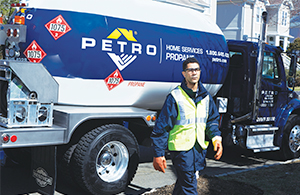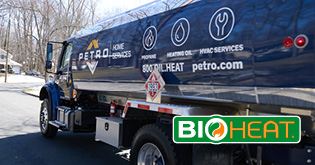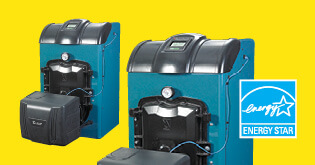- My Account:
- Sign In
- Register
- Make Payment
Sales 888.735.5651
Service 800.645.4328
Sales 888.735.5651
Service 800.645.4328
Important propane facts: frequently asked questions

Even though propane is one of the nation’s most versatile, efficient and 'green' sources of energy, it always pays to know more and get the facts about your home or business fuel source. You can learn all you need and get answers to some of the more important questions about propane here:
- What is propane? Propane is a hydrocarbon (C3H8) and is sometimes referred to as liquefied petroleum gas, LP-gas, or LPG. Propane is produced from both natural gas processing and crude-oil refining. Nearly 97 percent of propane used in the United States is produced in North America. It is nontoxic, colorless, and virtually odorless. As with natural gas, an identifying odor is added so the gas can be readily detected.
- Who uses propane? Propane is used by more than 12.6 million U.S. households for space heating and other purposes and by millions of other Americans for agricultural, commercial, industrial, and transportation applications.
- What can propane fuel in your home? As a clean, versatile energy source, propane is frequently used for home heating, water heating, cooking, fireplaces, and clothes drying. In outdoor spaces, propane is a widely used energy source for outdoor grills, lighting, and heating for pools and spas. When electric power goes out, propane is often the energy that powers standby generators.
- How can I recognize a propane leak in my home? Propane has a strong, unpleasant smell, like rotten eggs, a skunk's spray, or a dead animal. Propane manufacturers add the smell deliberately to help alert customers to propane leaks, which can create a safety hazard. You can ask your propane retailer for a demonstration to help everyone in your home or building identify leaks.
- What should I do if there's a problem with a propane appliance? Never modify or repair a propane appliance's valves, regulators, connectors, controls, or a propane tank's cylinder or parts. Instead, immediately call your propane retailer or a qualified service technician. They can inspect, adjust, repair, or replace any part of your propane system. Remember, your propane system incorporates special components to keep them safe for use.
- What is a pilot light? Many propane appliances may have a pilot light-a small, constantly burning flame inside the appliance (appliances without a pilot light often have electronic ignition instead.) If your appliance has a pilot light, it is an important safety feature. The pilot light ignites the main burner when needed.
- What should I do if my pilot light goes out? The Propane Education & Research Council (PERC) recommends that you get in touch with a qualified propane service technician to evaluate the appliance and relight the pilot light, which is a small, constantly burning flame inside the appliance that ignites the main burner. A pilot light that repeatedly goes out — or is difficult to light — may be signaling that there is a problem with the appliance or your propane system. Accidents and serious injuries can occur when customers attempt to fix a pilot light problem on their own.
- What assurance do I have that propane technicians are properly trained? Propane is used safely by millions of Americans — and stored, handled, and transported by thousands of professionals — every day. That safety comes from a combination of stringent codes and regulations and our industry's extensive training and safety awareness programs. In fact, the Propane Education & Research Council (PERC) and the National Propane Gas Association (NPGA) operate the Certified Employee Training Program (CETP), through which propane technicians train and get certified in all aspects of delivering propane and installing and servicing propane appliances. We update our training programs frequently to ensure that our technicians are equipped with the most current procedures and information available.
- Can we convert a natural gas furnace to propane? Yes. Many furnaces originally built for natural gas can be converted to propane. If you have more questions and need more details, please contact us at 1.800.645.4328 today.
- Are there alternatives to having a propane tank in my yard? Yes. Underground propane storage tanks are a popular option for single-family homes and housing developments. These large tanks can be buried underground because propane is a nontoxic fuel that doesn't contaminate aquifers or soil.
- If I use propane as my primary energy source, what size storage tank do I need? Generally, a 500-gallon tank can hold enough propane to meet the annual energy needs of an average four-bedroom home. Tanks of 1,000 gallons or more may be needed for large homes with swimming pools and hot tubs. We can help you determine exactly which size of tank you need to suit your specific needs.
Learn how propane is a better - and cheaper - choice than electric for your homeClick here to learn more about Petro can help you with all of your propane needs






